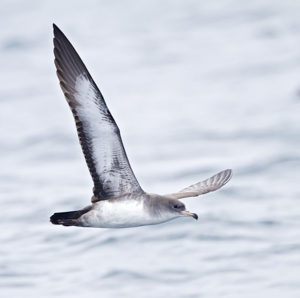Breaking News: BC Nature goes to court over Trans Mountain
On July 8, 2019, BC Nature filed an application in Federal Court seeking judicial review of the recent federal decision to re-approve the Trans Mountain Expansion Project (TMX).
BC Nature claims that the National Energy Board (NEB) failed to properly assess how TMX would affect marine bird species listed under the federal Species at Risk Act (SARA). Dr. Kees Visser, President of BC Nature, said that BC Nature is very concerned about a possible tanker spill and its disastrous effect on all marine life, especially on marine birds.
The federal government initially gave its approval to TMX in 2016, but the Federal Court of Appeal set aside that approval in 2018 in its landmark Tsleil-Waututh decision. The Court held that the NEB had failed to consider the project’s impacts under federal environmental assessment law, and had failed to discharge its duties to protect listed species under SARA.
Following the court decision, the NEB went back to the drawing board in so-called reconsideration hearings. BC Nature and Nature Canada both participated to ensure that the NEB properly considered the project’s impacts on vulnerable bird populations such as Pink-footed Shearwater and Barn Swallow. Unfortunately, the NEB didn’t do its job even on the second try. Chris Tollefson, lawyer with Pacific Centre for Environmental Law and Litigation (who has represented BC Nature since the original NEB hearings) added that it is unfortunate that BC Nature must go back to court to ensure these species get the benefit of the law.
Ecojustice lawyers representing other BC nature and environmental groups are also going to Federal Court asking for judicial review of the federal decision to approve TMX based on the inadequate NEB assessment of impacts on Southern Resident Orcas.
The Trans Mountain Expansion project is bad for nature, but on Tuesday the federal government announced that it will be built regardless.
Nature Canada and BC Nature have intervened in two sets of National Energy Board (NEB) hearings in 2015 and 2018, citing expert evidence that oil spills from project-related tankers would cause unacceptable impacts on marine birds and their habitat.
The National Energy Board is supposed to carefully consider the evidence and provide recommendations on national projects. But the board completely ignored our evidence four years ago. It did so again in the reconsideration hearings ordered by the Federal Court of Appeal last year.
The Board understood that the Federal Court of Appeal’s decision required them to address marine bird species at risk–and other listed wildlife species–potentially affected by marine shipping.
No consideration for at-risk marine birds
In particular, the National Energy Board committed to employing a species-specific approach to assessing the impacts on marine bird species at risk. They failed to do so despite the evidence cited by nature groups in the hearings. Their reconsideration report is entirely silent when it comes to their conclusions about the impact the project could have on at-risk marine birds.
This is particularly troubling given the expert evidence provided by Anne Harfenist on behalf of Nature Canada and BC Nature.
“Recent studies show that marine bird population declines in the area continue,” noted Harfenist in her written evidence.

She also noted changes since the 2015 hearings in the “at risk” status of six bird species present in the area. Specifically the Pink-footed Shearwater (endangered); Barn Swallow (threatened); Bank Swallow (threatened); Western Grebe (special concern); and Horned Grebe (special concern).
Assessment of the effects of Trans Mountain expansion on these newly listed species at risk is required by law but still was not done.
The National Energy Board also failed to assess the effects of routine TMX-related tanker operations (i.e., vessel collisions and sensory disturbance) on marine bird species a risk.
Oil tankers in the Salish Sea are risky for nature
The pipeline expansion would increase Edmonton to Vancouver pipeline capacity from 300,000 to 890,000 barrels per day, and result in oil tanks moving almost daily through the Salish Sea past critical habitat for marine birds and mammals.
The Salish Sea has powerful winter storms and narrow curving channels. Increasing oil tanker traffic carrying bitumen will increase the risk of a catastrophic oil spill. It will also create significant noise disruption to the already endangered Southern Resident Orcas on a daily basis.
Nature Canada and BC Nature was represented at both sets of National Energy Board hearings by Pacific Centre for Environmental Law and Litigation (Pacific CELL) lawyers Chris Tollefson and Anthony Ho.
It is unfortunate that the federal government has approved the Trans Mountain Expansion project (albeit with conditions) based on the shabby work of the National Energy Board. Clearly, not enough consideration was given to what would be best for at-risk species and nature.
A bright spot is that Bill C-69, expected to be passed by the Senate soon, would ensure that impact assessments of any future pipelines or oil tanker projects would be carried out by an independent panel and not the Canadian Energy Regulator (the successor to the NEB under Bill C-69).
To read more, read recent media articles from CBC News and The Globe and Mail.


